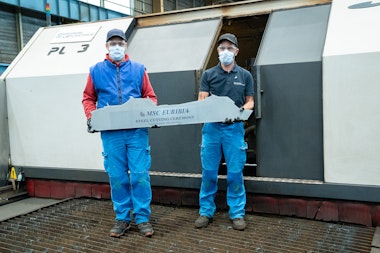Country or Region selection
Worldwide MSC International
Europe
MSC CRUISES BEGINS CONSTRUCTION OF MSC EURIBIA, ITS MOST ENVIRONMENTALLY ADVANCED VESSEL YET, MARKING ANOTHER STEP FORWARD IN THE COMPANY’S COMMITMENT TO ENVIRONMENTAL SUSTAINABILITY
28/06/2021• MSC Euribia named after Ancient Greek goddess of mastery of the seas
• Ship’s cutting of the first steel ceremony marks next step in MSC Cruises’ ongoing journey towards zero-impact operations
• MSC Euribia to become second ship in the MSC Cruises’ fleet powered by LNG to achieve substantial emissions reductions
• Ship set to come into service in 2023 and become 22nd vessel in the MSC Cruises fleet
Saint Nazaire, France and Geneva, Switzerland – 28 June 2021 – The first steel was cut today at Chantiers de l’Atlantique in Saint Nazaire, France marking the official start of construction of MSC Cruises’ most environmentally advanced ship to-date, and her name was also revealed. Set to come into service in June 2023, MSC Euribia will become the 22nd vessel in the MSC Cruises’ fleet and the second to run on liquefied natural gas (LNG), the cleanest marine fuel available at scale today. As every ship that joins MSC Cruises’ fleet, she will be equipped with some of the latest and most advanced technologies and solutions to minimise her environmental impact. The beginning of construction of MSC Euribia effectively marks another milestone in the Company’s commitment to environmental sustainability.
The start of her construction was marked by a traditional steel cutting ceremony in Saint Nazaire bringing the ship owner and shipyard together. As maritime custom dictates, MSC Cruises’ Executive Chairman Pierfrancesco Vago joined Chantiers de l’Atlantique’s General Manager Laurent Castaing to launch the cutting of the first steel for the new ship and, with it, the next step in MSC Cruises’ journey towards zero-impact operations.
Pierfrancesco Vago, MSC Cruises’ Executive Chairman said, “Just as the ancient goddess harnessed the winds, weather and constellations to master the seas, our vision is for MSC Euribia to master the deployment of sustainable technologies to protect and preserve our precious marine ecosystem. This ship marks a new milestone in our journey towards net zero impact operations and is testament to our commitment to foster and develop next generation environmental technologies.
“As a family with over 300 years of seafaring heritage, we always seek to protect the environment to safeguard our way of life and protect the planet for future generations. With our first LNG-powered vessel already under construction, MSC Euribia will further reduce emissions using the latest available technology. She will be one of the world’s most environmentally high-performing contemporary vessels.”
LNG is by far the cleanest marine fuel currently available at scale and it virtually eliminates local air pollutant emissions like sulphur oxides (99%), nitrogen oxides (85%) and particles (98%).
In terms of emissions with a global impact, LNG plays a key role in climate change mitigation and MSC Euribia’s engines have the potential to reduce CO2 emissions by up to 25% compared to standard fuels. In addition, with the subsequent availability of Bio and Synthetic forms of LNG, this energy source will provide a pathway toward eventual decarbonized operations.
LNG is also key to the development of fuel cell solutions for shipping as these technologies cannot be operated with traditional fuels. MSC Cruises, Chantiers de l’Atlantique and a consortium of leading energy and technology companies are working on the development of a pilot LNG-powered solid oxide fuel cell technology for cruise ships that could achieve a further significant greenhouse gas emissions reduction due to the higher efficiency of this technology.
MSC Cruises is committed to powering at least three upcoming ships with LNG, representing a total investment exceeding EUR 3 billion. The first of these, MSC World Europa is currently under construction in Saint Nazaire and set to enter service in October 2022. Construction of the third vessel is set to commence in early 2023.
Environmental technologies on MSC Euribia:
Engines and fuels:
• 4 Wärtsilä (12V and 16V) dual fuel engines generally running on liquefied natural gas (LNG), occasionally on 0.1% sulphur marine gasoil (MGO) so the ship will not require exhaust gas cleaning systems
Air Emissions:
• Selective catalytic reduction system that reduces NOx emissions by up to 90% when the ship runs on MGO (LNG offers a similar NOx reduction) – MSC Euribia will meet the IMO’s Tier III standards regardless of the fuel it uses
• Shore-to-ship power connectivity, allowing the ship to switch off its engines and connect to local power grids at ports where this infrastructure is available
Wastewater:
• Advanced wastewater treatment system complying with the International Maritime Organization’s MEPC 227(64) Resolution at the world’s most stringent standards – the so-called ‘Baltic Standard’
• Advanced ballast water treatment system will prevent the introduction of invasive species in the marine environment through ballast water discharges, complying with the International Maritime Organization’s Ballast Water Management Convention
Protecting Marine Life: Underwater radiated noise management system, with hull and engine room designs that minimise acoustic sound impact, reducing their potential effects on marine fauna, most particularly on marine mammals in the surrounding waters.
Energy Efficiency: All MSC Cruises’ newbuilds incorporate a wide range of energy efficient equipment that help reduce and optimise engine use. These include smart ventilation and advanced air conditioning systems with automated energy recovery loops that redistribute heat and cold to reduce demand. The ships use LED lighting controlled by smart management systems to enhance further the energy saving profile. In partnership with the shipyard, MSC Euribia will be fitted with automatic data collection systems for remote energy monitoring and advanced analysis, allowing real-time shoreside support to optimise operational efficiency onboard.
